#Art Philosophy
Explore tagged Tumblr posts
Text
╰┈➤Why Jhin and Hwei conceal their eyes - symbolism

In the world of artistic expression, hiding or covering certain parts of ourselves can hold significant meaning. This is especially true for Hwei and Jhin, two captivating characters from League of Legends. Each of them conceals an eye—Hwei his left and Jhin his right—and these choices go beyond mere aesthetics. They reveal deep insights into their personalities, their struggles, and their unique philosophies about art and creation. By exploring why they choose to hide their eyes, we can uncover the complex emotions and motivations that drive them as artists.
Eyes are an important symbol in Hwei's character. You can read more about it here.

Hwei: Concealing Chaos
Hwei's decision to cover his left eye can be interpreted as a manifestation of his desire to shield the world from the chaotic intensity of his artistic vision. As a character who embodies the creative process, Hwei grapples with the duality of artistry—the beauty and the chaos that often coexist. By hiding his left eye, he may be indicating a fear of unleashing the destructive potential of his emotions and creativity.
The Struggle with Expression
Hwei's background suggests a tumultuous relationship with his art. He represents an artist who is acutely aware of the power his creations hold. The left eye, often associated with intuition and insight, may symbolize the chaotic and uncontrollable aspects of his artistry. By concealing it, Hwei acknowledges the darker facets of his creative process that he struggles to manage. This concealment can be seen as a protective measure, both for himself and for those around him. Remember how empathic he is?
In the context of artistic expression, Hwei's hidden eye indicates the emotional turmoil he faces while trying to balance traditional artistry with his unique, often intense style. This tension reflects a broader theme in the art world: the battle between the artist's internal chaos and the need for external acceptance. Hwei's journey is not just about creating art; it’s about navigating the complexities of his identity as an artist. His concealed eye symbolizes the parts of himself that he feels are too dark or misunderstood, representing a struggle to integrate these elements into his public persona. His masters never wanted him to unleash his full potential - because of its danger.
The Emotional Connection
Moreover, Hwei uses his art as a means of connecting with others, and his hidden eye suggests that there are aspects of his emotional landscape that remain inaccessible. He embodies the notion that art is a bridge between the artist and the audience, yet his concealment signifies a barrier that complicates this connection. By covering his left eye, Hwei may inadvertently distance himself from others, revealing the challenges of vulnerability inherent in the creative process.
His journey mirrors the experiences of many artists who grapple with their inner demons while striving to create work that resonates with others. Hwei's struggle to balance his intense emotions with his desire for connection reflects a universal truth about the artistic experience: the fear of being misunderstood or misinterpreted.
Jhin: The Pursuit of Perfection
In stark contrast, Jhin's choice to cover his right eye speaks to his obsession with precision and control. As a meticulous killer and artist, Jhin embodies the philosophy that artistry requires an unwavering commitment to perfection. His quote, "Symmetry is so boring," shows that he might have covered up his right eye so that he is not symmetrical.
The Role of Symmetry
Jhin’s mask, which obscures his right eye, serves as a tool rather than a mere accessory. It is designed to enhance the challenge and danger associated with his artistic pursuits. By blocking vision in his left eye and dampening it in his right, Jhin intentionally removes depth perception, creating a disorienting experience that forces him to rely on his other senses. This choice reflects his belief that true artistry is derived from overcoming obstacles and embracing discomfort.
The Drama of Creation
Furthermore, Jhin’s mask stifles his breathing, adding an element of theatricality and drama to his character.
Jhin’s obsession with symmetry and perfection extends beyond aesthetics; it shapes his entire worldview. By concealing his right eye, he suggests that he is willing to sacrifice clarity and comfort for the sake of achieving his artistic vision. This choice reinforces his belief that true beauty lies in the balance of chaos and control, a dance he orchestrates with every kill.
The Intersecting Journeys of Hwei and Jhin
While Hwei and Jhin operate within different artistic paradigms, their choices to conceal their eyes highlight a shared struggle with identity and expression. Both characters grapple with the complexities of their artistic visions, albeit from different angles. Hwei’s concealment reflects a fear of chaos and emotional intensity, while Jhin’s serves as a testament to his quest for perfection and control.
Artistic Duality
Their journeys illuminate a broader theme within the artistic realm: the tension between creation and destruction. Hwei’s left eye symbolizes the emotional chaos that can accompany artistic expression, while Jhin’s right eye represents the calculated precision required to achieve a vision of beauty in death. Together, they encapsulate the duality of artistry—the balance between vulnerability and control, chaos and order.
Conclusion
In conclusion, Hwei and Jhin’s choices to cover their eyes are not mere aesthetic decisions; they are vital components of their identities as artists. Hwei’s left eye, hidden from view, symbolizes his struggle with the chaotic nature of his creativity, while Jhin’s right eye reflects his obsession with precision and control in his murderous artistry. Together, they illustrate the multifaceted nature of artistic expression, revealing the tensions that define the creative process. Their journeys remind us that the act of creation is often fraught with challenges, as artists seek to balance their inner chaos with the need for connection and acceptance. Through their concealments, Hwei and Jhin invite us to explore the depths of their artistic souls, encouraging a deeper understanding of the complexities of artistry and the human experience.
#lukai hwei#hwei#hwei league of legends#hwei lol#hwei the visionary#league of legends#hwei theory#jhinhwei#lol#khada jhin#art#art philosophy#league of legends lore#League of legends theory
75 notes
·
View notes
Text
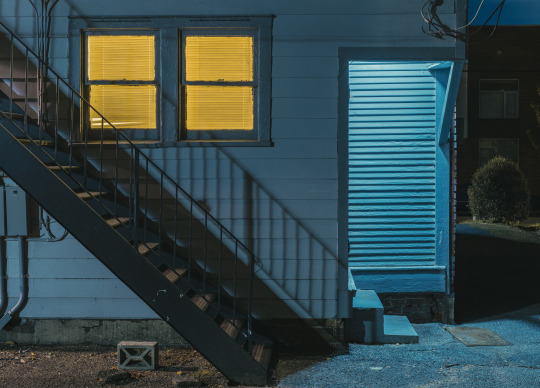
Transgression Finalized
Part of my The Self is a Home Photography Series. Memphis, TN.
2024
Website Behance Instagram Online Store
#anthony presley#night#anthonypresley#urban#photographers directory#city#street#memphis photography#memphis#tennessee#contemporary art#artwork#art#artists on tumblr#my art#art study#fine art photography#fine art#art photography#art philosophy#surreal photography
29 notes
·
View notes
Text
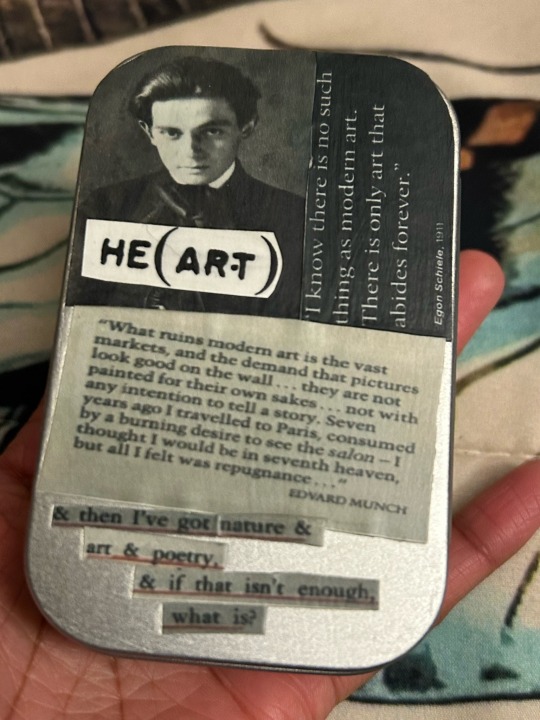
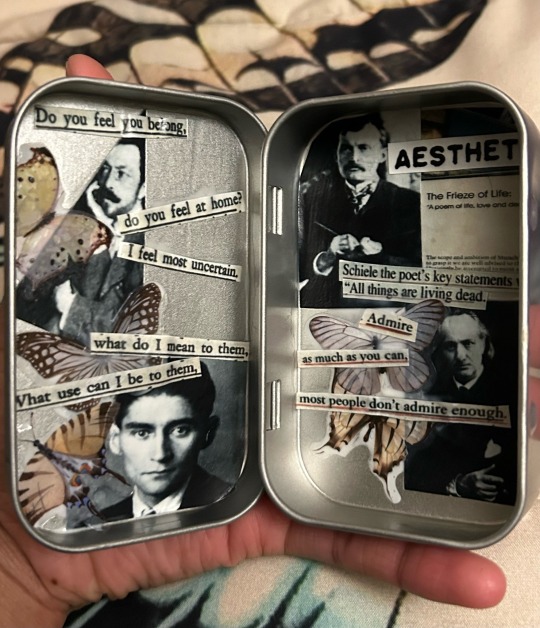
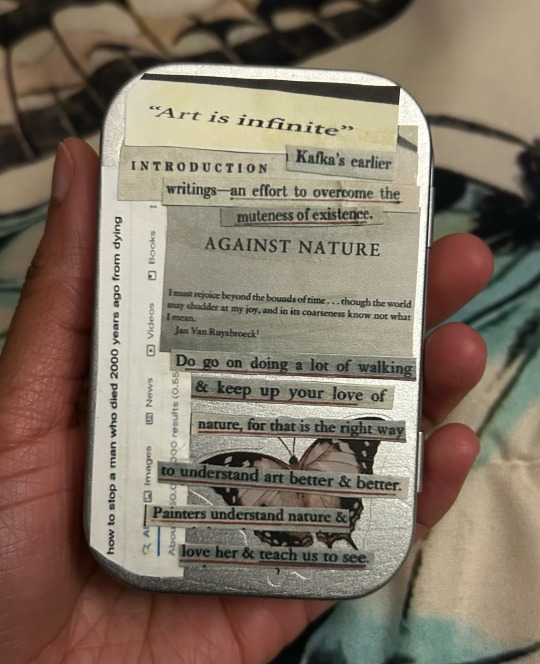
I could no longer resist the urge to make an altoid tin shrine for my inspirations. It long feels overdue
#egon schiele#edvard munch#charles baudelaire#wassily kandinsky#franz kafka#vincent van gogh#decadence#decadence philosophy#art theory#art philosophy#art psychology#existentialism#against nature#Karl Huysmans#altoid shrine#my art#dark acamedia#light acamedia#art history#art academia
106 notes
·
View notes
Text
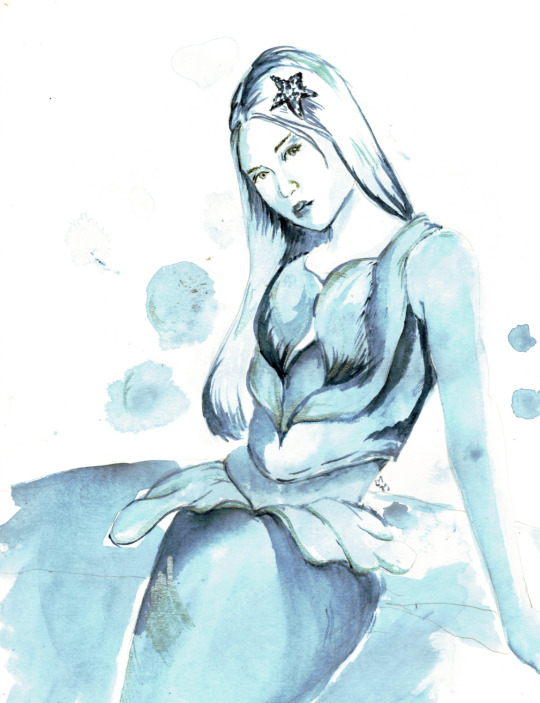
Today's #mermay painting is based on Yeji from Itzy. She is done on Fabriano hot-pressed watercolor paper in Ocean Blue from the Art Philosophy's Currents palette. Highlights in blue are from the Art Philosophy metallic pastels palette.
7 notes
·
View notes
Text
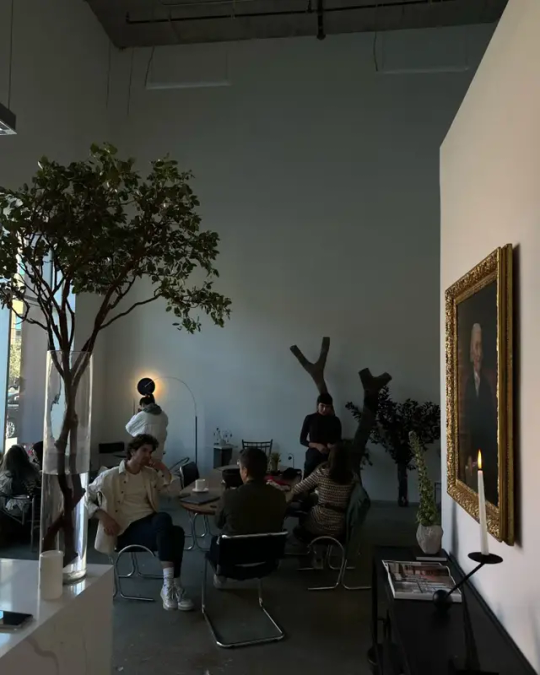
6 notes
·
View notes
Text
Creating 'Bad' Art
The reason you look at your art and feel such disgust and disappointment is because you know your potential. Delicacy and taste are a practiced sense that comes with time spent considering creation. Currently your taste is higher and more cultured than your ability which is why you feel able to cast judgement on other peoples work who are arguably more skilled than you.
But knowing you can't yet create that image you have in your head isn't a reason to never try. It's really the opposite. You need to create a thousand bad things to create your one good thing.
Lets say arts value comes from its impact. Bad art would be art that is unimpactful. Art that makes you feel nothing. You may be an elitist dick who hates modern art because it "takes not skill" and "I could've done that so what makes this circle on a blank canvas so special?". But that art make you feel an emotion, albeit anger, you still felt something at the hands of someone else. If your argument for why art is bad is that "you could've done it"... then why didn't you? You may feel something is bad because you feel you could've done it but you never did it. you never put yourself out there and made anything because you were too scared of making something someone found worthless. They did something. You did nothing.
"Make good work. Make interesting work. Make the work you want to see.' - My College Art Teacher.
Make bad art because god forbid you have a good idea and you lack the skills to make it real.
19 notes
·
View notes
Text
Book List: Aesthetics, Neuroaesthetics, & Philosophy of Art
Why Science Needs Art: From Historical to Modern Day Perspectives 1st Edition by Richard Roche (Author), Sean Commins (Author), Francesca Farina (Author)
Feeling Beauty: The Neuroscience of Aesthetic Experience by G. Gabrielle Starr (Author)
An Introduction to Neuroaesthetics: The Neuroscientific Approach to Aesthetic Experience, Artistic Creativity and Arts Appreciation 1st Edition by Jon O. Lauring (Editor)
Brain, Beauty, and Art: Essays Bringing Neuroaesthetics into Focus by Anjan Chatterjee (Editor), Eileen Cardilo (Editor)
Philosophy of Art: A Contemporary Introduction (Routledge Contemporary Introductions to Philosophy) by Noël Carroll (Author)
Philosophy of the Arts: An Introduction to Aesthetics 3rd Edition, by Gordon Graham (Author)
The Oxford Handbook of Aesthetics (Oxford Handbooks) Revised ed. Edition by Jerrold Levinson (Editor)
Aesthetics and the Philosophy of Art: The Analytic Tradition, An Anthology (Blackwell Philosophy Anthologies) 2nd Edition, by Peter Lamarque (Editor), Stein Haugom Olsen (Editor)
What Art Is by Arthur C. Danto (Author)
After the End of Art: Contemporary Art and the Pale of History - Updated Edition (Princeton Classics Book 10) by Arthur C. Danto (Author), Lydia Goehr (Foreword)
Ways of Seeing: Based on the BBC Television Series (Penguin Books for Art) by John Berger (Author)
Art and Its Significance: An Anthology of Aesthetic Theory, Third Edition 3rd Revised ed. Edition, by Stephen David Ross (Editor)
But Is It Art?: An Introduction to Art Theory by Cynthia Freeland (Author)
The Art Question by Nigel Warburton (Author)
Arguing About Art: Contemporary Philosophical Debates (Arguing About Philosophy) 3rd Edition by Alex Neill (Editor), Aaron Ridley (Editor)
Art Theory: A Very Short Introduction (Very Short Introductions) by Cynthia Freeland (Author)
Aesthetics: A Very Short Introduction (Very Short Introductions) Illustrated Edition, by Bence Nanay (Author)
The Cambridge Handbook of the Psychology of Aesthetics and the Arts (Cambridge Handbooks in Psychology) by Pablo P. L. Tinio (Editor), Jeffrey K. Smith (Editor)
Aesthetics: A Comprehensive Anthology (Blackwell Philosophy Anthologies) 2nd Edition, by Steven M. Cahn (Editor), Stephanie Ross (Editor), Sandra L. Shapshay (Editor)
Philosophies of Art and Beauty: Selected Readings in Aesthetics from Plato to Heidegger by Albert Hofstadter (Author, Editor), Richard Kuhns (Author, Editor)
Art, Aesthetics, and the Brain Illustrated Edition, by Joseph P. Huston (Editor), Marcos Nadal (Editor), Francisco Mora (Editor), Luigi F. Agnati (Editor), Camilo José Cela Conde (Editor)
#study guide#book list#neuroscience#neuroaesthetics#philosophy of art#art philosophy#dark academia#dark academia study guide
64 notes
·
View notes
Text
submitting my info for this art show i'm gonna be in and this part always like -- FUCK


i'm just gonna totally bullshit my way thru all of it ofc, it'll sound all profound and intellectual and whatnot and yes, art IS deeply profound and intellectual but i also don't take it all that seriously but i also take it very very seriously? if ya feel me
and honestly, when i made this piece i had the image appear in my brain, so i created what i saw in my head. and the deeper meaning manifested itself later. even for artists, the meaning of a work can change over time. sometimes i only get what i was trying to do in retrospect. this piece in question is over 10 yrs old. i was a different person then. i am still that person but also more. added more rings to my trunk as i grew. or something.
4 notes
·
View notes
Text
Me when I remember I don’t have to finish a sketch it can just be a sketch or I can take a picture of it and finish it in a program
*long drag of a cigarette*
Fuck man I wish I was an artist a thousand years ago when people gave a fuck.
#disabled artist#buy my art#local artist#artist#liminal reality#art sale#digital art#art philosophy#wtf#bro wtf
2 notes
·
View notes
Text
What has been the most interesting are the ways in which the universe yields to you when you declare to yourself and the world that you are an artist and mean it.
When things seem down, you keep creating, when things are good, you keep creating. You do this to show the universe that you are indeed the artist you say you are. After a while, in the most unexpected times, the god momentum which has taken over starts attracting people, resources, ideas 💡, and muses.
You begin to create things you never thought were possible. You find out how strong you are made and how resilient you truly are. You realize though, that that strength, and endless flowing of creative ideas comes from the original declaration. “I AM AN ARTIST” This declaration mixed with consistent creation everyday is where the alchemy flows and where the magic is made. It is what makes the shuffling back and forth from the conscious to subconscious realms possible.
#teach_or_trav#thoughts on what im 🤔#artist on tumblr#art#creativity#black creatives#the artists’ way#the artists way#art philosophy#black creativity#make art not content#father bronques#God Momentum#create#muse inspo#inspiration#fine art#performing art#alchemy#nyc artist#musician#music producer#the alchemy#Get Money Make Music
6 notes
·
View notes
Text
Not my usual witchy content, but I just published an article about art and how sometimes things get stuck between your mind and pencil or don't translate well onto paper. If that would interest you, please give this article a read!
#art#art problems#artist problems#artist block#art philosophy#substack#artists on tumblr#artwork#my art#drawings
2 notes
·
View notes
Text
The Bauhaus Movement: Redefining Art and Design
The Bauhaus School of Design, which flourished in Germany in the 1920s, is well-known for its influence on the design of products ranging from teapots to buildings and the development of design education worldwide. Its educational influence was felt mainly through its Basic Course in design. Many design schools still operate similar introductory design courses without understanding the…

View On WordPress
#Abstract Art#abstraction#aesthetics#Albers#american#Anni Albers#Anni Albers Bauhaus#Architectural#Architectural Influence#architecture#art#Art Education#art history#Art Integration#Art Philosophy#Art Revolution#Art School#artisans#Artistic#Artistic Expression#Artistic Heritage#Artistic Techniques#Artistic Vision#artists#avant-garde#Bauhaus#Bauhaus American influence#Bauhaus architectural influence#Bauhaus Architecture#Bauhaus Art
4 notes
·
View notes
Text
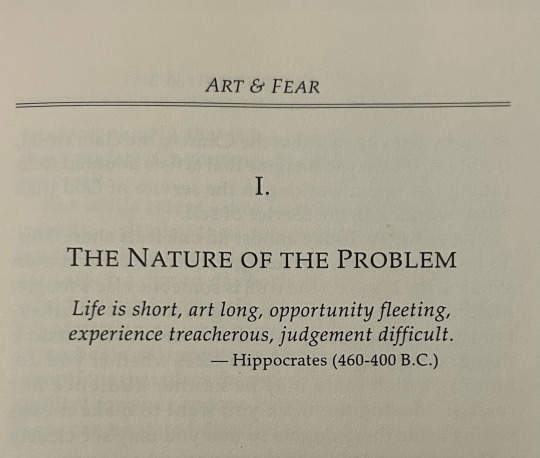
✨Art long
#Art & fear#art theory#art psychology#art philosophy#art academia#abide forever#art struggles#artist life#artist problems#hippocrates
8 notes
·
View notes
Text
...I will say, I think a thing that the critics of AI art get wrong is that, a lot of them say that "They'll never be able to get a real illustration job using their fake-art" due to the medium's limitations, but in my experience, that's not what a lot of committed AI artists are doing.
Like, a lot of dabblers fit that paradigm to be sure, but like, the people who're committed to it are the ones I see combining it with other art skills, like photomanipulation or Programming Shenanigans or creative writing or video editing or so-on.
Like, I'd say that AI Art flourishes best as a part of multimedia art approaches, one new tool amongst the many multimedia artists use, and to treat it as just a competitor to traditional illustration is to ignore that...
16 notes
·
View notes
Text
insane long post art philosophy astrophotography ramble below \/
i like to think about how much of my work is actually noticed by the viewers. this is kind of an interesting thread to pull on because i do multiple types of art, and each has a different level of accessibility and behind the scenes quality to it (that being like, how much of the work you do behind the scenes is acknowledged by the viewers).
i'd say digital art is the most relatable to people (almost everyone has drawn something in their life; no, they may not understand the full depth of what *you* do as an experienced artist but they get the general idea and skill level necessary to do it), and therefore the most widely praised. you could make the same argument for photography but that's a whole can of worms with how photography has been hollowed of meaning/normalized to death with smartphones, i'd wager they relate more to a subject and that the art itself of photography is somewhat foreign to them.
pixelart is in a sense, a more unknowable version of digital art. most people have probably seen it before, but not done it; they might think they have a general idea of how it's made (it may be right, or it may not be). it's still relatable on a surface "this drawing is cool" level of course but there's a distinct divorce with the final product and the behind the scenes factor. this comes up a lot, in art forms with a more unknowable behind the scenes factor the divorce is larger and larger.
astrophotography is a whole different paradigm. you might think, like pixelart, it's just an extension niche of photography; it isn't. it shares some proverbial blood, and the key thing here is that the shared traits are all in the final product- not behind the scenes. outwardly, it looks quite similar to photography; it may even use the same equipment, and can sometimes achieve similar results to an untrained eye. but behind the scenes is a completely different process.
this divorce is insanely large, and since outward result isn't necessarily easily noticed as different or unique (from normal photography of the same subjects), it creates this weird reaction where people *think* they can relate to the entire thing totally (since typically people understand the basic mechanics of photography; using a camera, taking a picture, etc) even though what's happening behind the scenes is utterly alien to them.
since the result is similar enough to regular photography, instead the value of the art is moved from the final result to behind the scenes. which is odd, pixel clusters or brush strokes individually aren't the value of the art; they're a means to an end. yet with AP, the value *is* partially at least in the technical quality of the image- something the average viewer literally cannot and does not see or understand, for the most part.
this overall, makes the art form naturally resistant to public viewing/large scale publicity. it also tends to create an echo chamber type of environment where the only people that can fully understand and appreciate the art, are other artists. imagine if by and large, the public couldn't really relate to digital/traditional art. think about the impact that would have on like, everything. it's a weird situation for an art form to exist in.
#photography#astrophotography#art#pixelart#astrophotography thoughts#art thoughts#art philosophy#philosophy#long post
14 notes
·
View notes